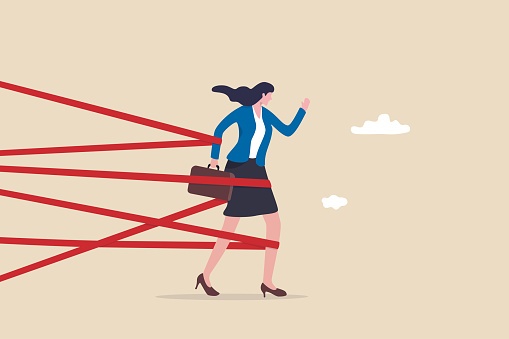Gender Equity in Law Careers

More than half of U.S. law students are women, but you might not realize this if you look at who leads most law firms. In a 2021 survey covering nearly 300 firms across the country, women made up only 23 percent of equity partners. Though gender equity efforts throughout the industry have led to significant progress, stubborn barriers remain, especially in the most lucrative positions. Some of this is due to illegal discrimination and outdated attitudes, firm practices, and traditions that seem benign might present just as much of a problem.
Partners and administrators who are truly concerned about building an equitable work environment need to look beyond anti-bias policies and the occasional social media post highlighting the achievements of women. The structures that denied opportunities to worthy attorneys were built over decades and can be found in every aspect of our legal workplace culture. Making an effort to hire strong women candidates is admirable, but that should only be the first small step in a comprehensive commitment to equal treatment. Several other measures should be considered if you are looking to level the playing field.
Re-assess the Importance of Billable Hours
Some firms might point to examples of women who were on the partnership track, but voluntarily left their job or cut back on time at the office, removing themselves from consideration for firm leadership. This is frequently used as a defense, but it seems time for the attorneys in charge to re-examine their workplace standards to create an environment that accommodates more flexibility.
Despite the increased focus on the importance of work-life balance, many firms still evaluate associates in large part based on how many hours they bill. This is particularly true in larger offices where it might take several years for a young lawyer to get assignments that allow them to show their legal ability. Relying too heavily on billable hours frequently cuts against lawyers who are often compelled to devote more time to family responsibilities.
Even if a there aren’t plans to have children, an eight- or nine-year partnership track might steer women away from applying to big-firm jobs and toward an in-house or government position. Emotional labor and undervalued work including but not limited to pregnancy, child care, domestic responsibilities, or caring for an elderly loved one are time-consuming. While the situation may be temporary, the effect on a lawyer’s career might be permanent. Using a long-term perspective on a young attorney’s career rather than judging someone on an annual hour total benefits everyone. Strong women candidates won’t take themselves out of the running for top jobs and firms will have a better applicant group and higher retention of talented attorneys.
Find Different Ways to Get the Job Done
The COVID-19 pandemic gave companies in every industry a crash course on how employees can contribute outside the traditional workplace environment. A few years ago, nearly every firm insisted that their attorneys be at their desk from nine to five (and usually much longer). Now, even litigators have gotten used to courtroom proceedings and depositions being held via Zoom and other types of video conferencing. Simply cutting out commuting time to and from the office can make an enormous difference to a guardian who needs to multitask during their average day.
Often, parents don’t have a problem putting in all of the time they need to get the job done. The problem arises when a child’s school event or medical appointment occurs during an inopportune time of the workday. Now, technology and remote work make it much easier to take an hour away from one’s job while remaining productive for the rest of the day.
Update Your Marketing
A law firm partner’s success depends on their ability to attract new clients. Some firms still devote a great deal of their marketing budget to expenses such as country club memberships and luxury boxes at sports arenas. Though these investments might still provide some return, building a marketing strategy around male-dominated leisure activities limits your firm’s potential and makes it tougher for women to succeed.
Social media, legal marketing websites, and video conferencing give attorneys the chance to connect with prospective clients at any time. Moreover, these encounters can focus on a lawyer’s relevant knowledge and experience rather than some type of outside activity. This saves everyone’s time and can include everyone as opposed to only attorneys with certain outside interests.
Break Down Practice Area Stereotypes
Though gender equity should be a concern for lawyers in all practice areas, some fields pose particular challenges. Women partners are especially rare in patent litigation and mergers and acquisitions. Part of this can be attributed to personal preference, but it’s impossible to ignore the role that bias plays in shaping the careers of women in the legal profession.
Larger firms are usually divided into numerous departments and it can be hard for any young associate to cross over into a different group. A young lawyer might be assigned to a group based on the attitudes of firm leadership or paired with a same-gender partner. During their first few years, lawyers should be exposed to different practice areas and partners. Mentorship is very important, but a woman starting her legal career might find that she’s best doing work in a department previously dominated by men. No doors should be closed before someone has the chance to see what’s behind them.
Along with structural changes, everyday interactions are also critical as law firms work toward gender equity. Given that women comprise a majority of current law school students, there is no good reason for these mistakes and micro-aggressions to continue. Taking concrete steps to remove some of the obstacles that hinder equity will move the legal industry closer to true fairness.
Editor’s note: We have eschewed using the term ‘female’, and prefer ‘woman’ or ‘women’ to be more inclusionary. Reference here.









